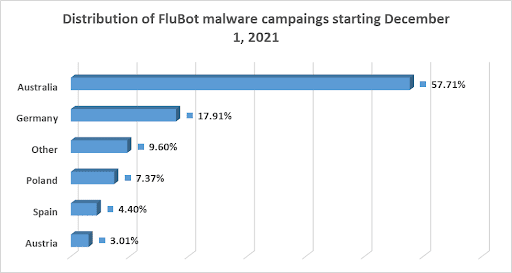Phishing is a type of cyber attack whereby you are coaxed into entertaining private information through a fraudulent email. A lot of people don’t know this, but phishing can be done through SMS as well through a process that is colloquially known as smishing. It turns out that two of the most severe types of malware out there right now called FluBot and TeaBot are being distributed through smishing as well as laced Android apps, wreaking havoc across most of Europe as well as Australia.
BitDefender Labs revealed that over 100,000 fraudulent SMS that were attempting to spread the FluBot malware have been detected since December, indicating that the period of time during which this malware has been active is not over yet by any stretch of imagination. The messages feature a wide range of prompts, such as suggesting that the recipient is in some kind of embarrassing video, offering fake updates to their browsers as well as voicemail notifications that would infect the user with the aforementioned malware.
The truly concerning thing about this malware is that it can spread really quickly since it can obtain access to your contact list and send messages to all of them via your device. Since the recipients would be getting the message from someone they know and trust, the likelihood of them clicking on it ends up being a lot higher which results in exponential growth in the spread of the malware overall.
TeaBot on the other hand is being spread through laced Android apps. These include QR Code Reader – Scanner App with 100K downloads, while QR Scanner APK, QR Code Scan, Weather Cast and Weather Daily each having 10K downloads and Smart Cleaner with 1,000 downloads these all were actually featured on Google Play Store. It’s clear that Google needs to revise its ad policy if malware laced apps can be advertised in such a blatant manner which results in the malware infecting a larger number of users.
Once downloaded, the TeaBot malware will enable third parties to install packages on your device which can be anything from Trojans to ransomware. This malware is still impacting users in countless countries, but interestingly TeaBot didn’t target users living in countries starting with the letter U such as Ukraine or the United States of America as well as Uruguay.
Read next: Phishing continues to create problems for people all around the world
BitDefender Labs revealed that over 100,000 fraudulent SMS that were attempting to spread the FluBot malware have been detected since December, indicating that the period of time during which this malware has been active is not over yet by any stretch of imagination. The messages feature a wide range of prompts, such as suggesting that the recipient is in some kind of embarrassing video, offering fake updates to their browsers as well as voicemail notifications that would infect the user with the aforementioned malware.
The truly concerning thing about this malware is that it can spread really quickly since it can obtain access to your contact list and send messages to all of them via your device. Since the recipients would be getting the message from someone they know and trust, the likelihood of them clicking on it ends up being a lot higher which results in exponential growth in the spread of the malware overall.
TeaBot on the other hand is being spread through laced Android apps. These include QR Code Reader – Scanner App with 100K downloads, while QR Scanner APK, QR Code Scan, Weather Cast and Weather Daily each having 10K downloads and Smart Cleaner with 1,000 downloads these all were actually featured on Google Play Store. It’s clear that Google needs to revise its ad policy if malware laced apps can be advertised in such a blatant manner which results in the malware infecting a larger number of users.
Once downloaded, the TeaBot malware will enable third parties to install packages on your device which can be anything from Trojans to ransomware. This malware is still impacting users in countless countries, but interestingly TeaBot didn’t target users living in countries starting with the letter U such as Ukraine or the United States of America as well as Uruguay.
Read next: Phishing continues to create problems for people all around the world




